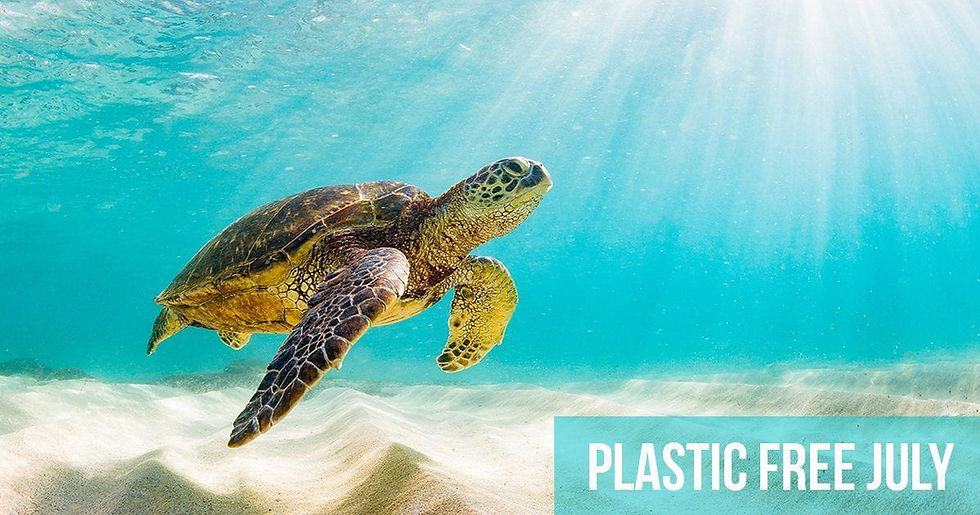Plastic-Free July is a global movement that inspires millions of people to reduce plastic usage, helping to create cleaner streets, oceans, and communities. Here are some fascinating facts to share with your children to help them understand the importance of this initiative.
The Impact of Plastic Pollution
Ocean Overflow: Every year, 8 million tonnes of plastic end up in our oceans, enough to cover every soccer field on Earth more than 30 times over.
Everlasting Plastic: Every piece of plastic you’ve ever used still exists somewhere. For example, the straw from your first day of school is likely still in a landfill, taking hundreds of years to decompose.
Future Predictions: By 2050, scientists believe there will be more plastic than fish in the oceans. Imagine trying to find Nemo in that mess!
Animal Confusion: Animals often mistake small bits of plastic for food. Eating this plastic can make their stomachs so full that they can't eat real food anymore.
Fun Activities to Turn Kids into Earth Heroes
Plastic Scavenger Hunt: Challenge kids to find plastic items around the house to show how prevalent they are. Advance the challenge by sorting single-use and reusable plastics and brainstorming plastic-free alternatives.
Nature Treasure Hunt: Explore the outdoors to discover all the cool, non-plastic things Mother Nature offers, like rocks and leaves. Make a list of these natural treasures.
Beach or Park Clean-Up: Organize a clean-up day where kids can help collect trash in local parks and beaches, making green spaces clean and enjoyable.
Declutter and Donate: Encourage mindful shopping by having kids sort through their belongings and donate what they don't need. This teaches them to think carefully about their purchases.
Sustainability Books for Kids: Introduce children to sustainability with age-appropriate books. Some favorites include:
Little Turtle And The Changing Sea by Becky Davies
The Lorax by Dr. Seuss
Your Planet Needs You: A Kids' Guide to Reducing Waste by Phillip Bunting
Old Enough To Save The Planet by Loll Kirby
Composting Project: Start a compost bin at home, allowing kids to learn about composting and its benefits in reducing plastic waste.
Nature Crafts: Use natural materials like leaves, sticks, and rocks for creative projects. Kids can also make mud pies for some messy fun!
Plastic-Free Picnic: Plan a picnic using reusable containers and utensils. Involve kids in meal preparation, emphasizing the importance of reducing plastic waste.
Decorate Reusable Bags: Let kids decorate cloth bags with fabric markers or paints, turning them into fashionable and functional items for plastic-free shopping.
Homemade Snacks: Make snacks from scratch to avoid plastic packaging. Kids can learn cooking skills and enjoy healthy, delicious treats. Here are some simple recipes:
Energy Balls: Blend dates, nuts, and coconut, then roll into balls.
No-Bake Granola Bars: Mix oats, honey, nut butter, and dried fruits, press into a pan, and chill.
Trail Mix Tray Bake: Spread nuts, seeds, dried fruit, and chocolate chips on a tray, drizzle with honey, and bake.
Plant a Garden: Whether it's a small plot or a few pots, gardening teaches kids about nurturing plants without plastic products. Growing their own food is rewarding and educational.
DIY Bird Feeders: Create bird feeders from recycled materials like milk cartons or toilet paper rolls to attract wildlife and reuse waste.
Upcycled Crafts: Use materials like cardboard boxes and old clothes for crafts, promoting creativity and sustainability.
Eco-Friendly Toys: Choose toys made from natural or recycled materials, providing fun without harming the environment.
DIY Play Dough: Make play dough from flour, salt, water, and natural food coloring, offering endless sensory play without store-bought plastic packaging.
Join Our Plastic-Free July Challenge!
We challenge you to rethink everyday actions and find plastic-free alternatives. Each week, we'll focus on a different theme and present mini-challenges. Remember, no one is too young to get involved! With these activities and more, kids can join in the fun and help make a difference.



Comments